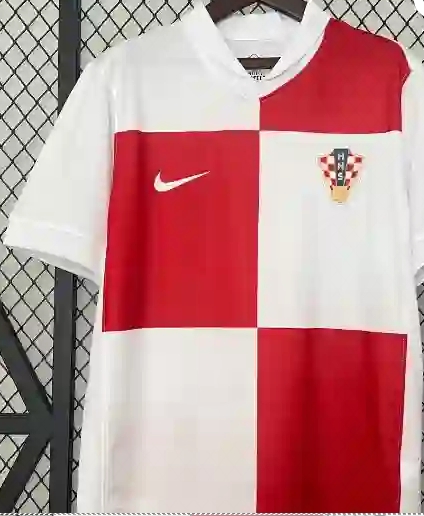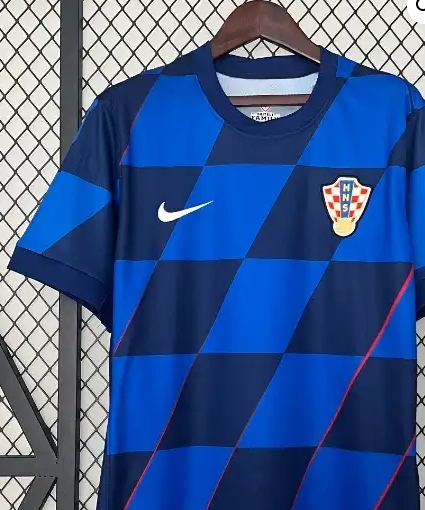

The Croatia national football team, affectionately known as Vatreni (the Blazing Ones), is a symbol of national pride and resilience, celebrated for their distinctive red-and-white checkered jerseys. Governed by the Croatian Football Federation (HNS), the team has risen from humble beginnings post-independence in 1991 to become a global football powerhouse. With a history marked by memorable World Cup and European Championship campaigns, their jerseys—designed by Nike—are among the most recognizable in the sport, embodying Croatia’s cultural heritage and fiery spirit. This article explores the team’s journey, the evolution of their iconic jerseys, and their significance to fans and players, ensuring originality while drawing on credible sources.
croatia soccer jerseys football YUPOO china B2B2C Wholesale Supplier Branded national croatia soccer jerseys retro shirts, join us on whatsapp | Yupoo fashion national teams croatia soccer jerseys players jerseys football retro jerseys reseller online store , Yupoo jerseys Replica top version for yupoo wholesale drop shipping jerseys to worldwide.
Croatia’s football journey began after the country gained independence from Yugoslavia in 1991. The HNS, established in 1912 but dormant during Yugoslav rule, became the governing body for the national team. The Vatreni debuted in 1990, and their first FIFA-recognized match was a 2-0 win against the United States in 1992. Since then, Croatia has qualified for six FIFA World Cups and five UEFA European Championships, with standout performances including a third-place finish in 1998, a runner-up spot in 2018, and another third-place finish in 2022.
Led by captain Luka Modrić, a Real Madrid legend, and featuring talents like Joško Gvardiol and Mateo Kovačić, Croatia has earned a reputation for punching above their weight. Coached by Zlatko Dalić, the team plays home matches at Stadion Maksimir in Zagreb or Stadion Poljud in Split, where fans create a sea of red-and-white checkers. The jerseys, a hallmark of their identity, reflect the šahovnica (checkerboard) pattern from Croatia’s flag and coat of arms, designed by artist Miroslav Šutej in 1990.
Croatia’s jerseys, manufactured by Nike since 2002, are iconic for their bold checkered design, a departure from the plain stripes or solid colors of other national kits. The šahovnica pattern, with its red and white squares, is a national symbol rooted in medieval heraldry, making the jerseys instantly recognizable. Over the years, Nike has modernized the designs while preserving their cultural essence, incorporating advanced fabrics and subtle tributes to Croatian heritage.
The home jersey is a white base adorned with large red checkers, symbolizing purity and national unity. The 2024/25 home kit, unveiled ahead of Euro 2024, features the largest checkers yet, creating a bold, stadium-filling visual. The Croatian Football Federation logo and Nike swoosh sit prominently on the chest, with the šahovnica shield at the heart. Inside the collar, a “Family” logo reflects Croatia’s tight-knit football culture. The jersey uses Dri-FIT ADV technology for breathability and moisture-wicking, with a tailored fit for optimal movement. It’s paired with red shorts and white socks with red accents, completing a striking look.
Fans can personalize jerseys with names and numbers of stars like Modrić or Gvardiol, available at retailers like the HNS Family Shop or Subside Sports. The 2024 home kit has been praised for its “heroic” design, evoking the 1998 World Cup bronze medal team.
The away jersey often draws inspiration from Croatia’s Adriatic coastline and vibrant culture. The 2024/25 away kit features a blue base with slanted red-and-white checkers, paying homage to the 1998 heroes while echoing the azure waters of the Dalmatian coast. The design includes a Glagolitic alphabet-inspired typeface for names and numbers, a nod to Croatia’s historic script. The kit is paired with blue shorts and socks, offering a sleek, modern aesthetic.
The away jersey’s vibrant colors and creative patterns make it a fan favorite, especially among younger supporters. Its lightweight, recycled polyester fabric aligns with Nike’s sustainability goals, ensuring comfort and eco-consciousness.
Goalkeeper jerseys typically feature darker tones like black or navy, with checkered accents for continuity. These kits prioritize durability with reinforced stitching and extra padding. Alternate kits, such as the black or gradient designs used in past tournaments, offer stylish options for fans and are often worn when the home kit clashes with opponents’ colors, as seen in the 1998 Germany match or 2018 England victory.
The šahovnica pattern is more than a design—it’s a national emblem, representing Croatia’s history, independence, and unity. The jerseys are a “flag we wear with our heads held high,” as described by the HNS Family Shop, uniting fans across generations and the global diaspora in countries like Australia, Canada, and the United States. Wearing the jersey is a declaration of pride, whether at matches, local bars, or street festivals.
The 2024 kits’ “Family” motif underscores the communal spirit of Croatian football, where players and supporters feel like kin. Social media posts on platforms like X highlight the jerseys’ global appeal, with fans calling the 1998 and 2016 designs “timeless” and the 2024 kits “a bold evolution.” The checkered pattern’s rarity in football, compared to common stripes or solids, makes it a standout, as noted in a Reddit discussion on unique kit designs.
Authentic Croatia jerseys are available through reputable retailers:
-Croatia's national yupoo jerseys soccer
HNS Family Shop: Offers home, away, and kids’ jerseys with personalization options and free shipping in Croatia for orders over €80.
Subside Sports: Stocks Nike jerseys with player printing, catering to U.S. fans with a wide selection.
World Soccer Shop: Sells official Croatia apparel, including replica jerseys and accessories.
SOCCER.COM: Provides match and fan versions of the 2024 kits, emphasizing the team’s checkered legacy.
Nike Official Store: Features Dri-FIT jerseys made with recycled materials, available globally.
Fans should avoid counterfeit jerseys, which lack the quality and authenticity of official kits. Prices for the 2024/25 home jersey start at €90, with youth sizes slightly lower.
Croatia’s jerseys are as stylish off the pitch as they are functional on it. The home kit’s bold checkers pair well with jeans and sneakers for a casual, patriotic look, while the blue away jersey adds a coastal vibe when styled with chinos or shorts. The breathable, lightweight fabric makes them ideal for summer outings, workouts, or pickup games. Accessories like HNS scarves or caps enhance the fan experience, especially at matches.
With Modrić nearing the end of his career and young stars like Gvardiol rising, Croatia’s future is bright. The 2024/25 jerseys, with their oversized checkers and cultural nods, signal a team embracing its legacy while pushing forward. As the Vatreni aim for their first major trophy, their jerseys will continue to evolve, blending tradition with innovation. Fans worldwide will wear the šahovnica with pride, celebrating a nation united by football.
In conclusion, the Croatia national soccer team’s jerseys are a vibrant embodiment of heritage, resilience, and ambition. The red-and-white checkers, blue coastal tributes, and Glagolitic accents tell a story of a nation’s journey from independence to global prominence. Whether worn by players or fans, the Vatreni jerseys are a symbol of unity and passion, making them a cherished icon in world football.
Croatia's national yupoo jerseys soccer team's journey has significantly impacted the country's identity. The team's achievements have united the nation, fostering a deep